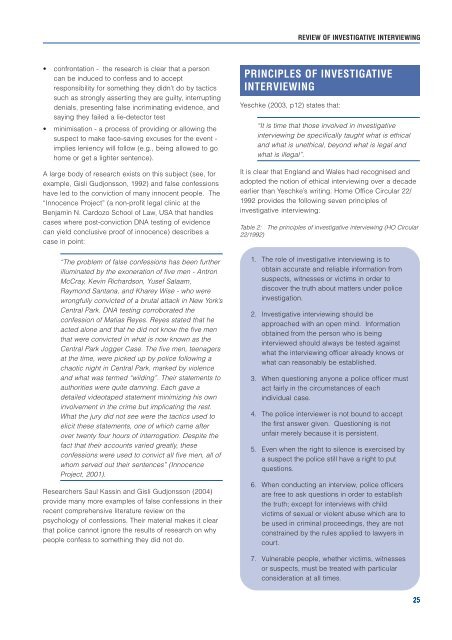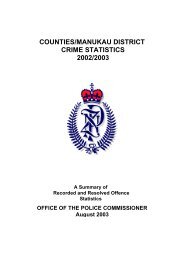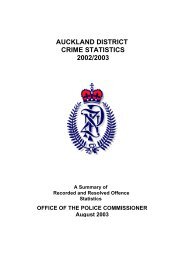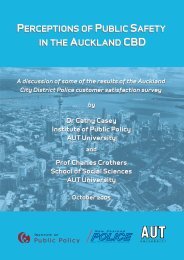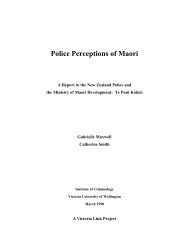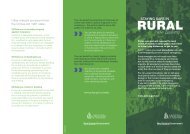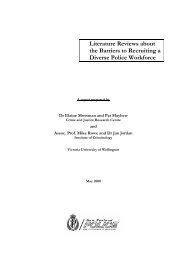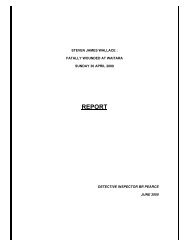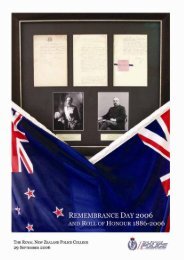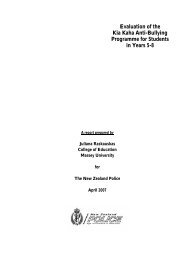Investigative interviewing: the literature - New Zealand Police
Investigative interviewing: the literature - New Zealand Police
Investigative interviewing: the literature - New Zealand Police
You also want an ePaper? Increase the reach of your titles
YUMPU automatically turns print PDFs into web optimized ePapers that Google loves.
REVIEW OF INVESTIGATIVE INTERVIEWING<br />
• confrontation - <strong>the</strong> research is clear that a person<br />
can be induced to confess and to accept<br />
responsibility for something <strong>the</strong>y didn’t do by tactics<br />
such as strongly asserting <strong>the</strong>y are guilty, interrupting<br />
denials, presenting false incriminating evidence, and<br />
saying <strong>the</strong>y failed a lie-detector test<br />
• minimisation - a process of providing or allowing <strong>the</strong><br />
suspect to make face-saving excuses for <strong>the</strong> event -<br />
implies leniency will follow (e.g., being allowed to go<br />
home or get a lighter sentence).<br />
A large body of research exists on this subject (see, for<br />
example, Gisli Gudjonsson, 1992) and false confessions<br />
have led to <strong>the</strong> conviction of many innocent people. The<br />
“Innocence Project” (a non-profit legal clinic at <strong>the</strong><br />
Benjamin N. Cardozo School of Law, USA that handles<br />
cases where post-conviction DNA testing of evidence<br />
can yield conclusive proof of innocence) describes a<br />
case in point:<br />
“The problem of false confessions has been fur<strong>the</strong>r<br />
illuminated by <strong>the</strong> exoneration of five men - Antron<br />
McCray, Kevin Richardson, Yusef Salaam,<br />
Raymond Santana, and Kharey Wise - who were<br />
wrongfully convicted of a brutal attack in <strong>New</strong> York’s<br />
Central Park. DNA testing corroborated <strong>the</strong><br />
confession of Matias Reyes. Reyes stated that he<br />
acted alone and that he did not know <strong>the</strong> five men<br />
that were convicted in what is now known as <strong>the</strong><br />
Central Park Jogger Case. The five men, teenagers<br />
at <strong>the</strong> time, were picked up by police following a<br />
chaotic night in Central Park, marked by violence<br />
and what was termed “wilding”. Their statements to<br />
authorities were quite damning. Each gave a<br />
detailed videotaped statement minimizing his own<br />
involvement in <strong>the</strong> crime but implicating <strong>the</strong> rest.<br />
What <strong>the</strong> jury did not see were <strong>the</strong> tactics used to<br />
elicit <strong>the</strong>se statements, one of which came after<br />
over twenty four hours of interrogation. Despite <strong>the</strong><br />
fact that <strong>the</strong>ir accounts varied greatly, <strong>the</strong>se<br />
confessions were used to convict all five men, all of<br />
whom served out <strong>the</strong>ir sentences” (Innocence<br />
Project, 2001).<br />
Researchers Saul Kassin and Gisli Gudjonsson (2004)<br />
provide many more examples of false confessions in <strong>the</strong>ir<br />
recent comprehensive <strong>literature</strong> review on <strong>the</strong><br />
psychology of confessions. Their material makes it clear<br />
that police cannot ignore <strong>the</strong> results of research on why<br />
people confess to something <strong>the</strong>y did not do.<br />
PRINCIPLES OF INVESTIGATIVE<br />
INTERVIEWING<br />
Yeschke (2003, p12) states that:<br />
“It is time that those involved in investigative<br />
<strong>interviewing</strong> be specifically taught what is ethical<br />
and what is unethical, beyond what is legal and<br />
what is illegal”.<br />
It is clear that England and Wales had recognised and<br />
adopted <strong>the</strong> notion of ethical <strong>interviewing</strong> over a decade<br />
earlier than Yeschke’s writing. Home Office Circular 22/<br />
1992 provides <strong>the</strong> following seven principles of<br />
investigative <strong>interviewing</strong>:<br />
Table 2: The principles of investigative <strong>interviewing</strong> (HO Circular<br />
22/1992)<br />
1. The role of investigative <strong>interviewing</strong> is to<br />
obtain accurate and reliable information from<br />
suspects, witnesses or victims in order to<br />
discover <strong>the</strong> truth about matters under police<br />
investigation.<br />
2. <strong>Investigative</strong> <strong>interviewing</strong> should be<br />
approached with an open mind. Information<br />
obtained from <strong>the</strong> person who is being<br />
interviewed should always be tested against<br />
what <strong>the</strong> <strong>interviewing</strong> officer already knows or<br />
what can reasonably be established.<br />
3. When questioning anyone a police officer must<br />
act fairly in <strong>the</strong> circumstances of each<br />
individual case.<br />
4. The police interviewer is not bound to accept<br />
<strong>the</strong> first answer given. Questioning is not<br />
unfair merely because it is persistent.<br />
5. Even when <strong>the</strong> right to silence is exercised by<br />
a suspect <strong>the</strong> police still have a right to put<br />
questions.<br />
6. When conducting an interview, police officers<br />
are free to ask questions in order to establish<br />
<strong>the</strong> truth; except for interviews with child<br />
victims of sexual or violent abuse which are to<br />
be used in criminal proceedings, <strong>the</strong>y are not<br />
constrained by <strong>the</strong> rules applied to lawyers in<br />
court.<br />
7. Vulnerable people, whe<strong>the</strong>r victims, witnesses<br />
or suspects, must be treated with particular<br />
consideration at all times.<br />
25


